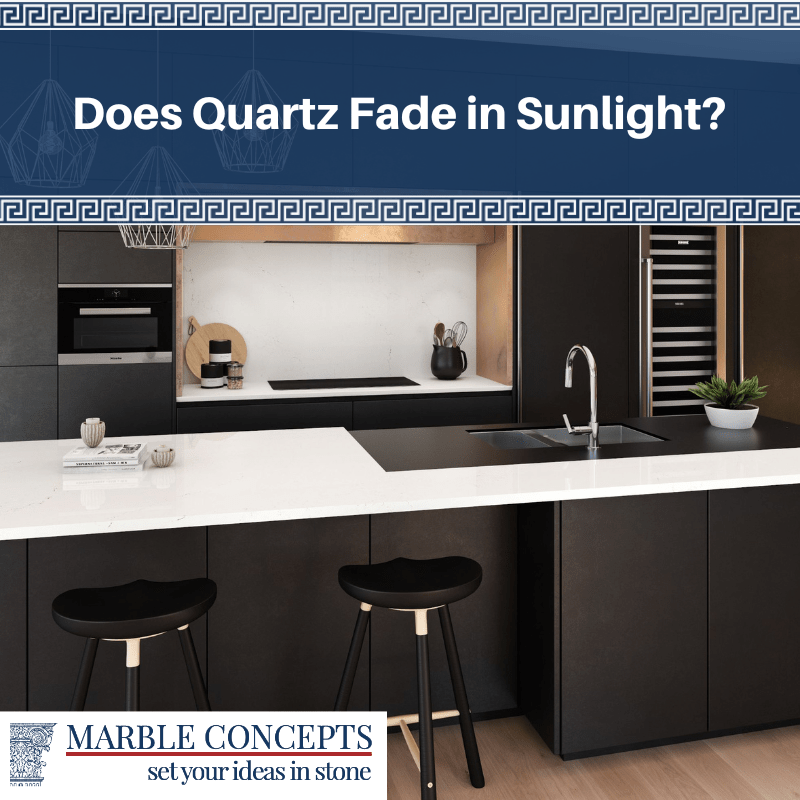When you are purchasing any kind of countertops, you will want to purchase countertops that are made from a material that is hard-wearing and aesthetically pleasing. Quartz is a fantastic material to choose when you are making either bathroom or kitchen worktops as it is partly natural and partly man-made, meaning there are lots of color options and the stone is also very hard-wearing. Every stone that you could consider for your kitchen worktops will all have a list of pros and a list of cons. Even though quartz is externally hard-wearing, it does not mean that it is invisible and will need to be cared for to make sure that it stays looking its best. Knowing that the next question to ask is: does quartz fade in sunlight?
Does Quartz Fade in Sunlight?
The answer to this one is pretty simple – yes quartz can actually fade in color due to the sunlight. Quartz is a fusion of man-made resins which normally take up between 5-10% and natural stone. Sometimes quartz stone can be made from added pigments and polymers, which is what helps create the desired color you would like for your kitchen worktops. What makes quartz more prone to sunlight damage is the sensitivity of these added resins. Resins and polymers can react with the ultraviolet rays that sunlight produces which then causes the color to fade and the quartz to change.
What Causes Quartz To Fade?
There are other elements that can cause quartz to fade in color if the stone is exposed to them for a longer period of time. These elements include harsh cleaning products, acidic food, and heat. These elements react differently with the resin in the stone and cause stains rather than general color fading.
Ultraviolet rays are the one element that can cause the general color of the quartz stone to fade. A particular type of quartz called Rose quartz is particularly prone to fading to white color and has been known to fade within a year. If you are looking at purchasing a Rose quartz it is best that you make sure there is not a lot of natural sunlight in the room that you want the quartz to be, for example, a bathroom without a skylight would be ideal for this type of stone.
Can Quartz Be Used Outside?
There is nothing stopping you from using quartz outside as it is durable and hard-wearing. Quartz will fade quickly if you do use it outside, especially in the summer when the sun is stronger and continues throughout the day. Common outdoor quartz areas such as window ledges or outdoor countertops will be affected quite quickly. There are ways you can protect your quartz countertops and therefore, if treated with care, quartz can be used in any outdoor area without too many issues.
How To Prevent Fading To Your Quartz In The Sunlight?
By adding a care routine to your quartz kitchen or bathroom countertops, you may be able to make sure that your warts do not fade in color at all or at least quickly! Here are some simple steps that you can follow to protect your quartz from UV rays and color fading:
● Choose high-quality quartz when making your kitchen, outdoor, or bathroom countertops from a reliable quartz brand.
● Always use chopping boards when placing hot utensils or appliances on your quartz countertop to avoid staining or added burns.
● Use tinted plastic film on your windows to help protect the quartz countertop from the strength of the UV rays.
● Apply a sealant on the surface of the quartz countertop as protection against UV rays.
● Aim to shut out direct sunlight in your kitchen or bathroom as much as possible using blinds.
What Are The Best Quartz Brands?
There are three different brands of Quartz stone that are known to be very high quality and less prone to color fading from UV rays.
Here is a list of the three different well-known quality quartz brands and why they are reputable companies to use:
● Caeserstone: Caeserstone makes the highest heat-resistant quartz on the market making this an ideal choice for outdoor use as it will be less sensitive to UV rays.
● Petros Stone: The quality of Petros Stone quartz is very high due to the use of high-grade quartz and high-grade pigments. Petros Stone quartz is known to be long-lasting, especially in color. This is partly due to Petros Stone using a seal on their quartz to make the stone more durable.
● Silestone: Silestone makes quartz that is both resistant to heat and stains, meaning that individual color fading from external elements is less likely to occur. The fact that the quart is both heat and stain-resistant also means that the quartz is less likely to fade in natural sunlight.
Protect Your Quartz Against Sunlight
The best way of making sure that your quartz kitchen or bathroom countertops do not fade in color is to protect them from UV rays that are caused by natural sunlight. If you have a house that is exposed to a lot of sunlight, it may be best to choose a different type of stone to use for your countertops such as granite. It is important to follow all care instructions and little steps to protect your quartz and make it more hard-wearing. Using a sealant on your quartz is one of the best ways to protect it from UV rays and could potentially add years onto your warts on kitchen or bathroom countertops and keep the color of your countertops looking the same shade as when you bought them.
Following the care instructions will be vital after your quartz kitchen or bathroom countertop is fitted. Call Marble Concepts to cut and install your stunning granite, marble, or quartz countertops today. Get your kitchen or bathrooms renovated with quartz today. Give us a call at 215-396-7393 today to learn more.






